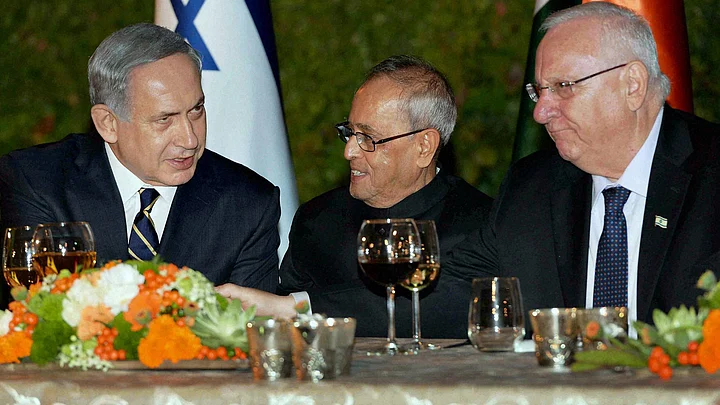President Pranab Mukherjee recently concluded a six-day landmark visit to Israel and Palestine, the first Head of the Indian State to do so. But was our president’s visit untimely, given that the “Knife Intifada” was ongoing, spurred by an Israeli raid on Temple Mount (al Aqsa mosque) in September?
Some commentators have suggested that our foreign affairs ministry should have advised Mukherjee to postpone his visit when violence peaked in October.
On the other hand, a postponement of his visit would have sent mixed signals to both countries. Palestinians were already upset with India’s abstention during the UN Human Rights Council resolution in July 3, 2015. The resolution had demanded an international inquiry into Israel’s Gaza War in 2014, in which more than 2,200 Palestinians had been killed.
India’s abstention was interpreted to be due to the BJP-led government’s policy of leaning towards Israel. The Wall Street Journal had interpreted South Bloc’s tepid response to Israel’s war in Gaza in July 8 and Prime Minister Narendra Modi’s refusal to censure Israel in parliament due to the BJP’s “more natural affinity with Israel than any previous Indian government”.
Postponing the Visit, a Better Option?
- MEA should have advised the president to postpone his visit when violence peaked in October.
- Palestinians were already upset with India’s abstention during the UNHRC resolution in July.
- India’s abstention interpreted as the BJP government’s inclination towards Israel.
- President’s visit provided India with an opportunity to articulate its views on Israel-Palestine.
- Times of Israel highlights that the president refused to take sides over the ongoing conflict.
Different Interpretations
Viewed from this context, shouldn’t we consider that the president’s visit has afforded an excellent opportunity for the highest level of articulation of India’s traditional stand on Israel-Palestinian relations? In fact even Israeli dailies had prominently displayed Mukherjee’s unequivocal statement in Jordan prior to his visit to Palestine and Israel. Thus, the Times of Israel carried an article written before Mukherjee’s arrival in Israel, headlined—“Indian President declares support for Palestinians ahead of Israel trip”.
The paper said that Mukherjee had quoted Gandhiji’s words: “Palestine belongs to the Arabs in the same sense that England belongs to the English and France to the French”. In fact the daily amplified this quotation, putting it in the proper context of Gandhiji’s speech in 1938 ‘in which he presents his opposition to Zionism saying it would be ‘a crime against humanity to reduce the proud Arabs so that Palestine can be restored to the Jews partly or wholly as their national home.’
The same trend of reporting was done by Jerusalem Post and Haartez, which firmly conveyed to the Israeli public that “India’s traditional support to the Palestinian cause remains steadfast and unwavering while we pursue strong relations with Israel,” as the president said in a speech at the University of Jordan. Thus, there was no doubt where India stood in the sanguinary disturbances that are going on in that region.
It is true that Mukherjee had to cut short his visit to Al Quds University on October 14 due to a student protest over the killing of four students by Israel. But Palestinians were also happy that he was the first head of state to stay overnight at Ramallah, where the Palestinian Authority’s headquarters is based.
Fresh Spate of Violence
The Palestinian Second Intifada, which was also known as al-Aqsa Intifada, began when Israel’s former prime minister, Ariel Sharon, defiantly marched on the Temple Mount in September 2000, accompanied by his Likud party followers and nearly 1,000 policemen. The march was intended to show that Israel fully controlled East Jerusalem and the al-Aqsa mosque. It also intended to portray the then ruling Israeli Prime Minister Ehud Barak as weak-kneed and unable to guard Israel’s interests. As a result, Sharon won a decisive majority in the February 2001 elections. The Intifada lasted till January 1, 2005. Around 300 Israeli security officials and 1010 civilians were killed during this period, along with 3,000 Palestinians.
The present clashes also started when Israeli police allowed Jewish activists to tour the courtyards of the mosque. This was interpreted to mean that Israel was forcibly trying to alter the rules of the mosque visits. It has been the fear of Palestinians that Israel would eventually control the mosque fully, deny access to the Palestinians and finally demolish it to build their “temple”.
In April 2015, Jewish extremists hoisted the Israeli flag over the Ibrahimi mosque in Hebron and prevented Muslim prayers. The Mourabitoun (Al-Aqsa worshipper movement) feared that the Muslim Palestinians were “prohibited from entering the mosque to pray, while Israeli settlers are allowed to enter the mosque and roam around freely under police protection”. Israel “banned” Mourabitoun consequent to these clashes and started arresting the group’s members. Thus a long period of violence is feared by all.
(The writer is a former Special Secretary, Cabinet Secretariat, and also member of the High Level Committee which inquired into the police performance during 26/11 Mumbai.)
(At The Quint, we question everything. Play an active role in shaping our journalism by becoming a member today.)
